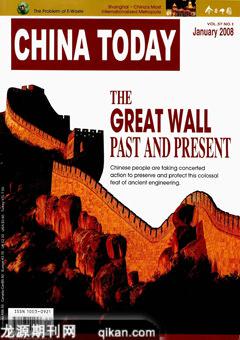Opportunity Knocks for Chinese Sports Translators
LI YAHONG
few years ago, being a sports translator meant starving to death,” jokes Song Dongsheng, who has worked mainly as a team interpreter and trainer since graduating from Shanghai International Studies University in 1982. Over the years, many of Songs colleagues switched to more lucrative fields like machinery, chemicals, energy and automobiles. But recent times have seen a sudden explosion in international sporting events in China, with demand for sports translators rising accordingly. In the lead up to the Beijing Olympics, it is becoming increasingly difficult to even find a sports translator, no matter how high the salary on offer.
Sports Yahoo, for example, has been searching for a comprehensive sports translator for half a year, but is yet to fill the position. Management says competent online translators are quite rare. The Investigative Report on Translator and Interpreter Services in China produced by the Science and Technology Translators Association, Chinese Academy of Sciences, casts some light on why this is so. The report found that Beijing needs around 10,000 professional sports interpreters for the Olympics, yet its estimated there are only 4,000 in the whole country.
This huge demand has created a sellers market for qualified specialists. As the sports translation supervisor of Transn Information Technology Co., Ltd., Song Dongsheng now earns excellent money. “The monthly pay of a part-time sports translator in the company is RMB 5,000,” says Huang Ji, vice president of Transn, “and for experts with five years experience or more, annual salaries top RMB 200,000.”
Beijings rapidly growing sports translation needs are not only due to the huge number of Olympic-related documents being produced. Companies specializing in broker services for professional athletes, news media, and sporting clubs all require high-level interpreters. Some of the highest level services are required for match interpretation. “During the Beijing Olympic Games, its estimated the total value of sports translation will be over RMB 70 million,” claims Huang Ji.
As the official translation services supplier of the Beijing Olympics, Yuanpei Translation is taking on 900 full-time Olympic translators at an average yearly pay of RMB 100,000. “At the opening ceremony of the Beijing Olympics, there will be 1,500 translators covering the event in over 100 languages,” says Yuanpeis general manager Jiang Xiaolin.
Besides having several languages at their fingertips, sports interpreters need to be well acquainted with professional sporting terms. “Generally speaking, its not possible to consult dictionaries due to the time lag this creates. Relying on dictionaries can also lead to misinterpretations, and delay games,” explains Song Dongsheng. “For example, there are various definitions of ‘left topspin in table tennis, but only one is acceptable to foreigners. Those on top of these specific terms are in high demand for the Olympics.”
To help meet the shortfall in translation services, the Beijing Organizing Committee for the Games of the XXIX Olympiad (BOCOG) are hoping young volunteers can learn some specific sporting terms. Song Dongsheng has been designated by BOCOG to provide training. According to him, “To meet BOCOGs requirements, the volunteers need to be not merely well versed in professional sports English, but also familiar with the rules and procedures of various games.”
“Apart from enhancing the training of Olympic volunteers, the gap in sports translation can also be made up by means of science and technology,” says Li Yashu, vice-chairman of the Science and Technology Translators Association. Transn, for example, is cooperating with organizations rich in Olympics translation experience to build a multi-language terminology database. In addition, an “electronic translator” available via mobile phone will provide foreigners with a constant and convenient service during the Games, simultaneously translating the latest information and reports about the Olympics into a range of tongues.
Beijing as a whole is launching an all-out effort to host the 2008 Olympics, and the authorities dont want the language barrier to prevent foreigners from partaking in the citys daily life. Taxi drivers and retired people are learning conversational English, announcements on buses and subway trains are in both Chinese and English, and ten teams of linguistic monitors are patrolling public places to search for language gaffes on signs.
“The Beijing Olympics has provided opportunities for sports interpreters, and institutions of higher learning should foster talent in this field,” believes Li Yashu. “Judging from the current situation, the money-making potential of the translation service industry in China is enormous.”

